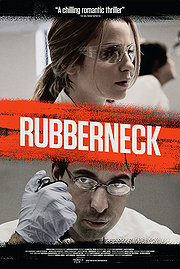Rubberneck
Written by Garth Donovan and Alex Karpovsky
Directed by Alex Karpovsky
USA, 2013
Lena Dunham isn’t the only filmmaker who also appears in front of the camera on the HBO series Girls. Alex Karpovsky (who plays Ray on the show) is a director in his own right, having directed the micro-indies The Hole Story and Woodpecker around the same time that Dunham was directing her earliest efforts. His new film Rubberneck is much like the characters in Girls: not completely together, but intriguing and well-intentioned.
Karpovsky himself plays Paul Harris, a scientist in Boston who is a rubberneck in many ways. In a few scenes he is literally rubbernecking on the side of a highway, which is maybe a too literal way to illustrate that he’s also rubbernecking at the people around him, watching them go by without being able to make any real connection. He thinks he’s made a connection with his co-worker Danielle (Jaime Ray Newman), but she does not agree. The film is a 90-minute exploration of how he unwinds under the pressure of his pining for her.
In some ways Rubberneck tests the audience’s patience, as Karpovsky is perfectly willing to sit on Paul’s buttoned-up persona for some time before creating some rising action in his plot. That same aesthetic applies to the look of the film, as Karpovsky is not afraid to make a scene dull via ugly lighting, should Paul’s mood demand it. The result is a film which wants to explore loneliness in the same way as Taxi Driver, but which simply does not have the same pop in every scene.

Of course it is no sin to be unable to measure up to Scorsese, and Rubberneck does some things well in its own right. For one thing, it understands that the stereotype of the “nice guy” is a sexist delusion, and that a female character has to have agency in her own love life. Paul’s belief that Danielle “ought” to be with him ignores her right to make her own decisions, and his standing in judgment of a possibly poor decision on her part just leads Paul down an even darker path. This is exactly why independent cinema exists: these are places where most mainstream Hollywood films are not willing to go, because it’s easier to assume that the two leads simply deserve to fall in love.
Rubberneck may well lose a few audiences in its third act. It is based on a real-life crime, and Paul Harris makes the sort of ridiculous decisions that real-life criminals often make, but which moviegoers never find believable. But the movie is redeemed with a terrific final scene, in which Paul and his sister (Amanda Good Hennessey) have a tense, emotional conversation despite the fact that it takes place entirely over the phone – another thing which happens often in real life, but doesn’t often lead to movie magic.

The character of Paul is an interesting one, despite whatever problems this film has. He’s an outcast even among other outcasts, struggling to find his way socially to a degree that even most unlucky-in-love film characters do not do. It may be overly simplistic to say that one trauma caused all of his issues, but Karpovsky does a fine job in exploring all of the different ways that the one event damaged Paul. Understanding the true degree of that damage is what will cause this imperfect psychodrama to haunt audiences long after it’s over.
-Mark Young

